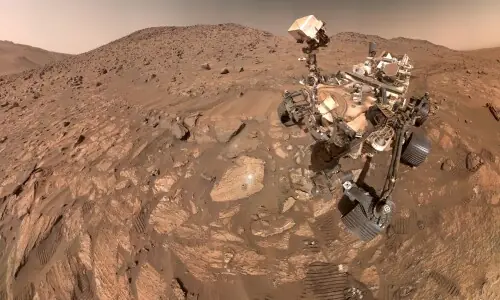Washington: Scientists have discovered possible evidence of ancient microbial life on Mars in a sample of rock taken by NASA’s Perseverance rover from sediment on a lake’s bottom billions of years ago. However, the minerals found in the sample can also have originated through nonbiological processes.
The finding, which was described in a study released on Wednesday, is among the strongest indications yet that life may have once existed on Earth’s planetary neighbor.
In search of evidence of prehistoric life, the six-wheeled rover has been investigating Jezero Crater, a region in the northern hemisphere of the planet that was once filled with water and home to an old lake basin, since setting foot on the Martian surface in 2021.
Using its several onboard instruments, Perseverance has been gathering samples of rock and loose debris known as regolith and analyzing them.
In a location known as the Bright Angel rock formation, the rover collected the recently described Sapphire Canyon sample.
Coarse-grained conglomerates, a type of sedimentary rock made up of gravel-sized particles bound together by finer-grained sediments, and fine-grained mudstones make up this formation.
A “potential biosignature” was found in sedimentary rocks that are billions of years old, according to Joel Hurowitz, a planetary scientist at Stony Brook University who led the study that was published in the journal Nature.
SOURCE: DAWN NEWS





